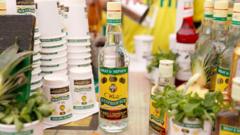The question of what constitutes "Jamaica Rum" has ignited a legal battle on the island. The Spirits Pool Association aims to tighten geographical indications, prohibiting overseas aging to enhance protection against competition, but National Rums of Jamaica argues it could face closure. The conflict centers on heritage and economic stakes, calling into question the authenticity of rum production in Jamaica.
Battle Over "Jamaica Rum": Legal Dispute Sparks Passion for Cultural Identity

Battle Over "Jamaica Rum": Legal Dispute Sparks Passion for Cultural Identity
A legal dispute between Jamaican rum producers reveals deep-rooted concerns about authenticity and economic impacts as the country seeks to define its product.
Rum, a symbol of Jamaica's vibrant culture, is at the center of a heated legal dispute that could redefine its authenticity in the global market. Amid concerns over the integrity of the term "Jamaica rum," the Spirits Pool Association (SPA) is pushing for stricter regulations on the aging process of rum produced on the island, aiming to clarify what qualifies as Jamaican.
Amendments approved by Jamaica’s Intellectual Property Office (JIPO) last October have prohibited the aging of rum outside of Jamaica, a move designed to enhance the geographical indication (GI) designation that was first established in 2016. This change, advocated by the SPA, aims to strengthen the market presence of Jamaican rum in key export regions like the EU and the US, positioning it as a premium product with intrinsic value tied to its origins.
However, the National Rums of Jamaica (NRJ), which controls a significant portion of Jamaica’s rum production, is strongly opposed to the amendment. The NRJ, comprising multiple stakeholders including the Jamaican government and foreign distilleries, argues that the new regulations could cripple its business model, which relies on exporting and aging rum overseas—practices they assert do not diminish the spirit's Jamaican identity.
Rum distillers believe that overseas aging could undermine the authenticity and uniqueness that make Jamaican rum special. Christopher Gentles, general manager of the SPA, has expressed bewilderment at NRJ’s objections, stating that for the authenticity of the product to be maintained, aging should occur on Jamaican soil. The SPA emphasizes potential economic benefits from local aging, including the retention of value-added services and advancement in the rum tourism sector.
The debate is not unique to Jamaica; Barbados faces similar challenges in establishing national standards for its rum, which highlights the broader complexities of defining cultural products in a global marketplace. With conflicting interests among producers, stakeholders await the upcoming hearing scheduled for April 28, which could shape the future of rum production in Jamaica.
As the dispute rages on, opinions remain divided among producers and the general public about the best path forward. The SPA hopes to achieve a compromise that serves the interests of all parties involved. In a nation where rum is deeply intertwined with cultural history, the outcome of this dispute may hold significant implications for how Jamaican identity is defined in the modern world.
Local media has voiced strong support for the recent regulatory changes, citing the importance of preserving the Jamaican brand against foreign appropriation. The Gleaner has advocated for the protection of “uniquely Jamaican products,” stating that foreign ownership should always align with maintaining the integrity of Jamaica's storied brand.



